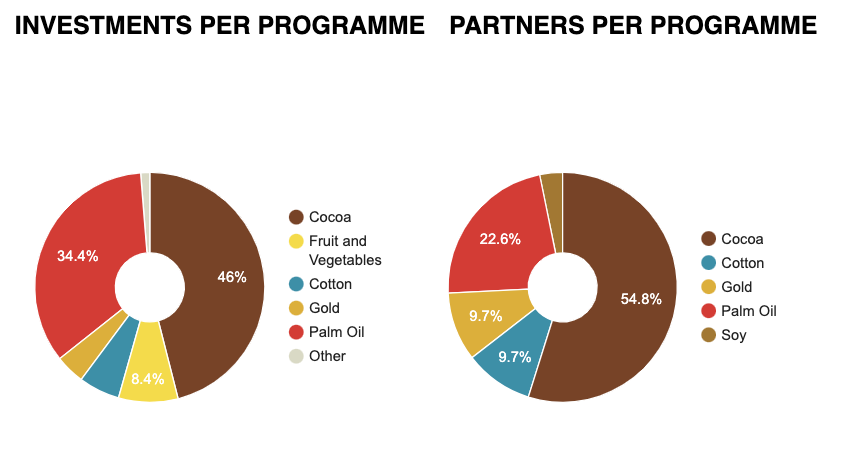REGIONAL COMMODITY PROGRAMMES
Solidaridad West Africa’s cotton programme is focusing on building the capacity of the African Cotton Producer’s Organisation (AproCA) to become a strategic partner for the Better Cotton Initiative (BCI) in West Africa.

As the world looks to West Africa as the new frontier for increasing global supply, the Sustainable West Africa Palm oil Programme (SWAPP) is exploring how to increase productivity and profitability of the producers in the region.

Solidaridad West Africa’s cocoa programme has introduced new models to facilitate sustainable development of the cocoa supply chain in Ghana by bringing input services and support to the farmer through Rural Service Centres (RSCs).

Solidaridad’s gold programme in West Africa facilitates the transition of Ghana’s small-scale mines toward certification. Dakete Small Scale Company Ltd, Kyereyiaman Cooperative and Golden Resources are three mines on the verge of obtaining the Fairmined certification.

EXTERNAL DEVELOPMENTS
The growing concern for the lack of young people’s involvement in agriculture is driving Solidaridad to review its programmes to include initiatives to help make agricultural professions attractive for the youth. Among the reasons proffered for the lack of involvement of youths in cocoa farming is the low profitability coupled with climate change impacts affecting crop production. These have become key issues that influenced Solidaridad’s cocoa development strategies in 2014.
Solidaridad is currently discussing the Next Generation Cocoa Youth programme that will focus on addressing the barriers for youth engagement in cocoa cultivation.
At the same time, West Africa is now seen as the new frontier for increasing global supply of palm oil. The region continues to see a growing interest from large companies to partner with programmes, communities, and governments in developing palm oil estates and mills, especially in Nigeria, Gabon, Sierra Leone and Liberia. Chanel, a luxury brand company based in France, has begun working with smallholder producers by investing in a palm oil mill for smallholder farmers.
Decline in gold prices since 2011 presented a challenge to Solidaridad as it remained difficult to engage mid-size mines and mining companies to adopt voluntary certification standards which led to a delay in the field implementation of a Cartier Foundation (CF) funded project seeking to promote Responsible Jewellery Council (RCJ) standards.

RESULTS AND PARTNERSHIPS
Solidaridad is implementing various sustainability projects with support from international industry partners, local companies and farmer organizations. Cocoa projects are funded by Cargill and other companies, as well as Ecom Trading, Noble Resources, Touton S.A and the Netherlands Embassy.
The major achievements of the year include production of over 49,000 metric tons of certified cocoa for export by a total of 39,663 farmers who have been supported in adopting good agricultural and rehabilitation practices. Thanks to the newly established 15 Rural Service Centres under the Cocoa Rehabilitation and Intensification Programme, about 19,000 cocoa farmers will have access to agricultural inputs, planting materials, fertilizer and chemicals. Four premium payment announcement ceremonies were organized with a total of GH₵ 7,152,600 for the production of certified cocoa beans.
The oil palm Best Management Practices (BMP) pilots under the SWAPP showed progressive increases in yields of fresh fruit bunches from a baseline of 6.5 tonnes per hectare to 12.8 tonnes per hectare on average, translating into increased incomes for farmers and food security for householders.
Under the cotton project in Senegal, 23 facilitators of the cotton company SODEFITEX, were trained on BCI standards and 6,347 producers were trained on the Better Cotton new assurance model and integrated soil fertility management.
DONORS AND ORGANIZATIONS
The cocoa programme in Ghana has established critical partnerships with a number of organizations and institutions. To achieve sustainable cocoa production through cocoa certification, the programme has partnered with Noble Resources for the Kookoo Pa (formerly AHANSUCOFA) project; ECOM for the EAACS project; Cargill for the CAACS project and Touton SC in the PBC-Touton project.
Partners in Ivory Coast include Conseil du Café Cacao on the establishment of the Public Private Partnership Platform for cocoa. The oil palm programme is funded by the Netherlands Embassy in Ghana, and the programme collaborates with the International Plant Nutrition Institute, Proforest Initiative, Oil Palm Research Institute, Benso Oil Palm Plantation, Twifo Oil Palm Plantation, Norpalm Ghana Ltd and Chanel.
The Cartier Charitable Foundation has joined up with SWA to implement the “Partnering for Better Livelihood in the Gold Supply Chain” project. The REC also collaborates with The Alliance for Responsible Mining (ARM) and Responsible Jewelry Council (RJC). The Dutch National Postcode Lottery (NPL), has partnered with SWA to implement “Face of Ghana’s Gold project”.
